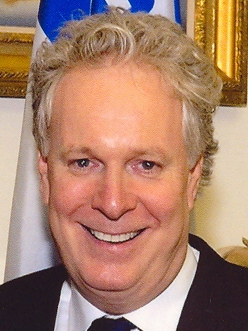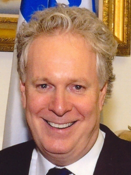Top Qs
Timeline
Chat
Perspective
2008 Quebec general election
Canadian provincial election From Wikipedia, the free encyclopedia
Remove ads
The 2008 Quebec general election was held in the Canadian province of Quebec on December 8, 2008. The Quebec Liberal Party, under incumbent Premier Jean Charest, was re-elected with a majority government, marking the first time since the 1950s (when the Union Nationale of Maurice Duplessis won four consecutive elections) that a party or leader was elected to a third consecutive mandate, and the first time for the Liberals since the 1930s, when Louis-Alexandre Taschereau was Premier.

The 2008 election also marked the first time that Québec solidaire won a seat.
Remove ads
Issues
Summarize
Perspective
Charest called the election on November 5, saying he needed a "clear mandate" and a majority to handle the economic storm. He was criticized, however, by the Parti Québécois and the Action démocratique du Québec for calling a snap election to get a majority when they were willing to work with him to fix the economy.[1]
Most notably, the election was marked by a significant collapse in support for the ADQ. Formerly a relatively minor party, the ADQ had attracted significant protest support in the 2007 election, beating the Parti Québécois to Official Opposition status. In 2008, however, the party's support dropped back to approximately 15 per cent of the popular vote, roughly the same range of support the party attracted before 2007. As a result of this loss of support, Mario Dumont announced in his concession speech that he would step down as party leader.[2]
In the final days of the election campaign, the concurrent parliamentary confidence dispute became an issue, with Prime Minister Stephen Harper attacking the credibility of a potential Liberal-New Democratic Party coalition government because the Bloc Québécois had pledged to support the coalition on motions of confidence. Both Marois and Dumont called upon Charest, a former leader of the federal Progressive Conservatives, to clarify where he stood on the coalition and on Harper's use of anti-sovereigntist rhetoric in the dispute.[3] Charest emphasized that the Bloc MPs had been legitimately elected by Quebecers, and stated that "I live in a society in which people can be sovereigntists or federalists, but they respect each other. The same thing should prevail in the federal parliament."[4]
Media analysts noted that while Charest's Liberals won a majority, the final result was much narrower in both the popular vote and the seat total than polls even just a few days before the election had predicted, because the Liberals only won an eight-seat majority, a result which was widely credited to a late voter swing toward the PQ as a result of Harper's comments.[5]
Remove ads
Timeline
2007
- March 26 - 38th Quebec general election
- April 4 - Mario Dumont becomes the leader of the Official Opposition.
- April 5 - Swearing in of the liberals members of the National Assembly
- April 12 - Swearing in of the ADQs members of the National Assembly
- April 18 - Swearing in of the Cabinet members
- April 25 - Swearing in of the PQs members of the National Assembly
- May 8 - Resignation of André Boisclair as leader of the Parti Québécois
- May 9 - The opening speech of the 38th National Assembly of Quebec is pronounced by Premier Jean Charest.
- May 10 - François Gendron becomes the interim leader of the Parti Québécois, so the leader of the Second Opposition group.
- May 24 - The budget speech is pronounced by Monique Jérôme-Forget. Both opposition parties announce that they will vote against the budget, causing a crisis in the National Assembly.
- June 1 - Monique Jérôme-Forget adds 111 million dollars to the budget to avoid the holding of a general election. The budgetary policy is approved by 46 votes against 44.
- June 7 - Pierre Duchesne becomes the twenty-eighth Lieutenant Governor of Quebec.
- June 26 - Pauline Marois is elected as leader of the Parti Québécois without opposition.
- August 13 - Resignation of Rosaire Bertrand as MNA of Charlevoix
- September 24 - In a by-election, Pauline Marois is elected MNA of Charlevoix with 59.2% of the vote.
- October 17 - Resignation of Diane Lemieux as MNA of Bourget
- November 15 - Resignation of André Boisclair as MNA of Pointe-aux-Trembles
2008
- March 8 - 97.2% of the liberals delegates support their leader, Jean Charest.
- March 13 - Monique Jérôme-Forget pronounces her second budget speech. Mario Dumont announces that the ADQ will vote for the budget, whereas Pauline Marois announces that the PQ will vote against. Thus, the government is safe.
- March 16 - 94.8% of the ADQ's delegates support their leader, Mario Dumont.
- March 29 - Guy Rainville is elected as leader of the Green Party against Scott McKay.
- April 9 - Resignation of Roch Cholette as MNA of Hull
- May 12 - In by-elections, Maka Kotto, Maryse Gaudreault and Nicole Léger are respectively elected MNAs of Bourget, Hull and Pointe-aux-Trembles. The voter turnout is around 34% in the three electoral districts.
- June 25 - Resignation of Philippe Couillard as MNA of Jean-Talon and swearing in of Yves Bolduc as minister of Health and Social Services
- July 14 - Resignation of Michel Bissonnet as president of the National Assembly
- September 24 - Resignation of Michel Bissonnet as MNA of Jeanne-Mance–Viger
- September 29 - In a by-election, Yves Bolduc is elected MNA of Jean-Talon with 58.5% of the vote.
- October 21 - Election of François Gendron as president of the National Assembly
- October 22 - Resignation of Russell Copeman as MNA of Notre-Dame-de-Grâce
- October 23 - ADQ members of the National Assembly André Riedl and Pierre-Michel Auger cross the floor to sit as members of the Liberal caucus.
- November 5 - Premier Jean Charest calls a general election for December 8.
- November 25 - Leaders debate
Remove ads
Opinion polls
Summarize
Perspective



Remove ads
Campaign slogans
- Action démocratique du Québec: Donnez-vous le pouvoir ("Give yourselves the power")
- Parti libéral du Québec: L'économie d'abord OUI ("The economy first YES")
- Parti québécois: Québec gagnant avec Pauline ("Quebec is a winner with Pauline")
- Parti vert du Québec : Votons pour l'avenir ("Let's vote for the future")
- Québec solidaire : Pour un système de santé public / Pour des salaires décents / Pour une souveraineté solidaire / Pour une économie verte et locale / Pour Éole Québec ("For a public health system" / "For decent incomes" / "For an independence in solidarity" / "For a green and local economy" / "For Wind Québec" [Éole Québec is a play on the state-run Hydro-Québec power utility, and refers to the nationalization of the wind energy industry])
Remove ads
Incumbent MNAs not running for re-election
Liberals
Péquistes
Results
Summarize
Perspective
The overall results were:[6]
Synopsis of results
- = open seat
- = turnout is above provincial average
- = winning candidate was in previous Legislature
- = incumbent had switched allegiance
- = previously incumbent in another riding
- = not incumbent; was previously elected to the Legislature
- = incumbency arose from byelection gain
- = other incumbents renominated
- = previously an MP in the House of Commons of Canada
- = multiple candidates
Comparative analysis for ridings (2008 vs 2007)
Seats that changed hands
Summary analysis
Remove ads
See also
References
External links
Wikiwand - on
Seamless Wikipedia browsing. On steroids.
Remove ads





